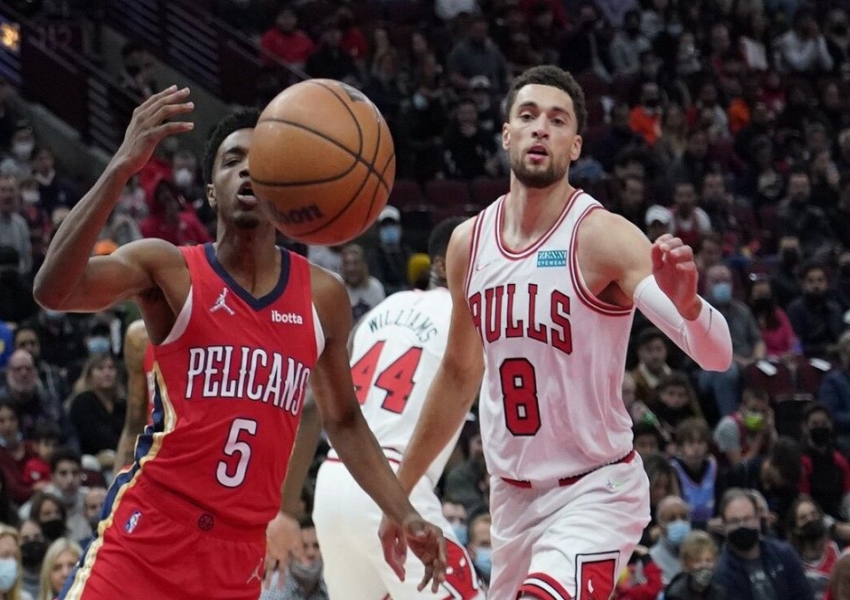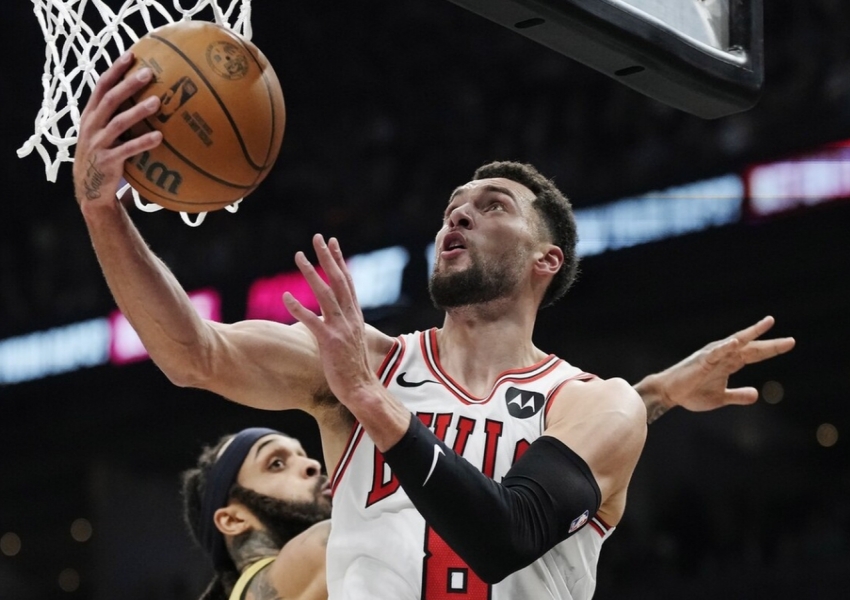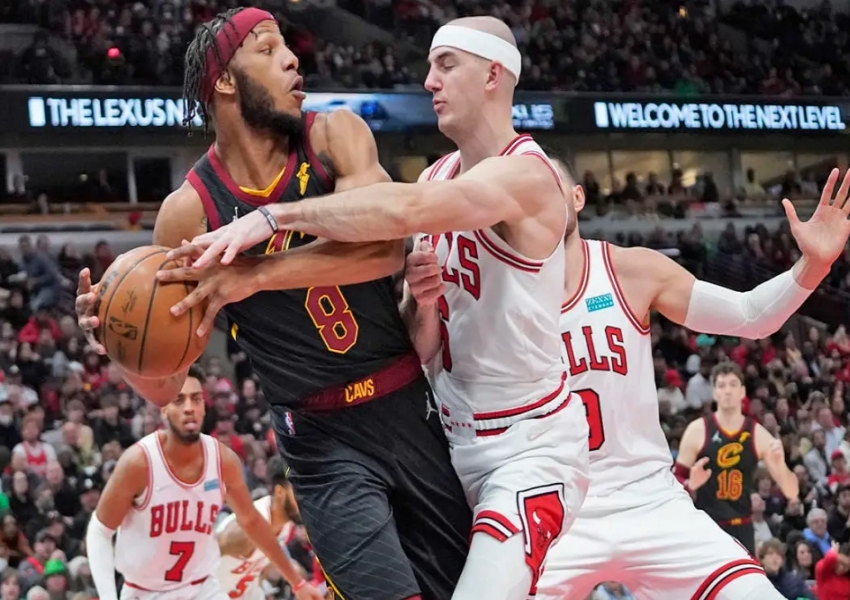No Takers! NBA's Biggest "Negative Asset," 29-Year-Old All-Star, 15 Trade Attempts, 15 Failures
The Chicago Bulls, a team boasting the lowest-ranked "Big Three" in the NBA, are in a predicament. Despite having three All-Stars in DeMar DeRozan, Zach LaVine, and Nikola Vucevic, the team has only made it to the playoffs once in their three-year tenure together, only to be eliminated in the first round with a 1-4 record. This disappointing performance has left fans disheartened and the management embarrassed. As a result, the Bulls decided to rebuild. However, months have passed, and the only significant move they managed was trading away Alex Caruso.

Caruso, who posted averages of 10+ points, 3 rebounds, 3 assists, 1 steal, and 1 block per game last season while shooting over 45% from the field and 40% from beyond the arc, was the Bulls' most attractive asset. His defensive prowess earned him consecutive selections to the NBA All-Defensive Teams, making him a highly coveted 3-and-D player. The Bulls traded Caruso to the Oklahoma City Thunder in exchange for young guard Josh Giddey without adding any additional assets.

Despite the summer's efforts, Vucevic and DeRozan are still with the team, though it is expected that they will find new homes soon. The Bulls' biggest headache remains Zach LaVine. Team reporter K.C. Johnson revealed that the Bulls have engaged in trade talks with multiple teams, including the Sacramento Kings, Orlando Magic, and Philadelphia 76ers, proposing 15 different trade scenarios for LaVine, all of which were rejected. The lack of interest from these teams indicates that LaVine's stock has significantly dropped.

LaVine, the centerpiece of the Bulls' rebuild, was the 13th overall pick in the 2014 NBA Draft. A two-time Slam Dunk Contest champion and the MVP of the 2016 Rookie Challenge, LaVine was a two-time All-Star in 2021 and 2022. He also represented Team USA in the Tokyo Olympics, winning a gold medal. Standing at 6'5" with a 6'8" wingspan, LaVine's static athleticism might not be outstanding, but his dynamic capabilities are elite. His vertical leap measures 41 inches, his shuttle run is 9.9 seconds, and his lane agility time is 10.42 seconds, ranking first among his draft class.
Early in his career, LaVine was known for his explosive dunks, but after joining the Bulls, his offensive game expanded, and he became recognized as a top-tier scorer. During his peak 2020-21 season, LaVine averaged 27.4 points per game on 50% shooting from the field and 41% from three, ranking seventh in scoring across the league. His true shooting percentage was an impressive 63.4%, the best among players at his position. At that time, many believed LaVine would become the next superstar shooting guard.
However, as the Bulls assembled their Big Three and aimed for playoff success, LaVine's weaknesses became apparent, ultimately turning him into a "negative asset." His injury history is a significant concern; since joining the Bulls, LaVine has missed over 180 games, averaging about a third of each season on the sidelines. Additionally, his impact on team success has been questionable. Even in his best statistical season (2020-21), the Bulls had a net rating of -0.6 points per 100 possessions with LaVine on the court, compared to +0.1 when he was off.
LaVine's offensive efficiency is inconsistent, largely due to his limited scoring arsenal. He relies heavily on outside shots, and his poor ball-handling skills make it difficult for him to drive and draw fouls, resulting in only 5-6 free throw attempts per game. When his shot is falling, he can string together multiple three-pointers, but if he's off, he lacks the ability to adjust. This inconsistency becomes glaring in the playoffs, where his shortcomings cannot be masked.
Defensively, LaVine has long been below league average, often described as a liability. While he can score 40 points on offense, his defensive lapses can allow 50 points. He frequently loses his man and lacks defensive awareness. Besides his on-court issues, LaVine's contract is another hurdle. He is owed $138 million over the next three years, with an average annual salary exceeding $43 million, making him a "negative asset" that no team is eager to take on unless the Bulls sweeten the deal with additional assets.
The Bulls' decision to build around LaVine has not panned out as hoped. His dynamic scoring ability is overshadowed by his injury history, defensive liabilities, and inconsistent performance in crucial moments. As a result, the Bulls are stuck with a high-priced player who hasn't lived up to his potential as a franchise cornerstone.
While LaVine's talent is undeniable, his overall impact on team success has been a point of contention. His scoring prowess is often overshadowed by his defensive lapses and injury-prone nature. Teams are wary of committing to a player who has yet to demonstrate consistent positive influence on winning.
As the offseason progresses, the Bulls' front office faces a daunting task. Finding a trade partner for LaVine requires navigating his substantial contract and proving that he can be a valuable addition to a new team. His situation is a cautionary tale of the risks involved in investing heavily in a player with glaring weaknesses.
For LaVine, a change of scenery might be what he needs to revitalize his career. A team with a strong defensive foundation and established stars could help him thrive in a role that maximizes his strengths while mitigating his weaknesses. However, until a suitable trade partner emerges, the Bulls and LaVine remain in a challenging position, with the future of their rebuild hanging in the balance.
Copyright Statement:
Author: focusnba
Source: FocusNBA
The copyright of this article belongs to the author. Reproduction is not allowed without permission.
Recommended Blog
- He's Back! Morant's Bold Claim: Confirming the 2024-25 NBA Championship
- It's Not Over! Clippers Face Two Major Issues: What to Do with Tucker and Mann?
- $17 Million for Three Years! Can 30-Year-Old Kris Dunn Be Revived?
- Spurs Trading 5 for 1 Kawhi Leonard? The NBA Laughs as the Western Conference Race is Set to be Shaken Up Again
- $7 Billion! LeBron James Set to Join the NBA Expansion: Two New Teams in the U.S.
- Trade Finalized! Westbrook Officially Leaves the Clippers: Is This His Last Chance?
- Lakers Eyeing Ayton! 3-for-1 Trade Proposal Unveiled! The Western Conference to Heat Up Again...
- Keep Dismantling! Last Year They Sold Their 3D Guard, This Year Their 3D Center. What’s the Bucks’ Rebuilding Strategy?
- Leave, Klay! Even if It Means a Minimum Salary, Don’t Stay with the Warriors
- From Playoff Fringe to NBA Champions: How Brad Stevens Turned the Celtics into a Contender in Just Three Years
Hot Blog
- Boom! Boom! 100% Shooting Night—Lakers Feeding the NBA’s Best Defensive Center…
- Nightmare: AD Out for the Season—Do the Mavericks Have a Future?
- Kevin Durant = Three First-Round Picks? In Just Two Years, the Suns Lost Big!
- Tension in New York? Mikal Bridges Calls Out Thibodeau’s “Plantation-Style” Rotation!
- Major Decline! What Is De'Aaron Fox’s True Level with the Spurs?
- Completely Out of the Rotation! Why 25-Year-Old Cam Reddish Can't Get on the Court Anymore
- A Miraculous Buzzer-Beater—But What Level Is Kawhi Leonard Really At Now?
- 4,000 Threes! Just How Impossible Is Stephen Curry’s Latest Record?
- $110 Million Over Two Years—Butler Was Worth Every Penny
- $293M Supermax and an MVP? Is There Any Doubt Left for Shai Gilgeous-Alexander?